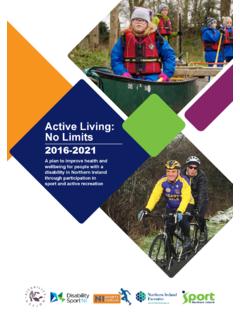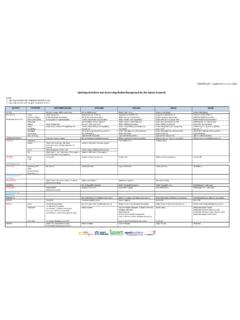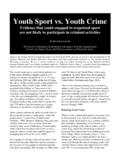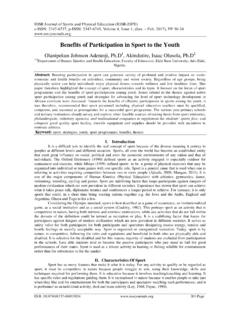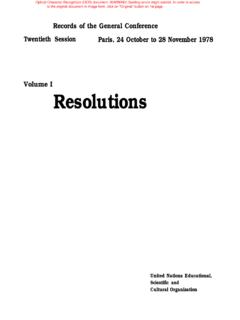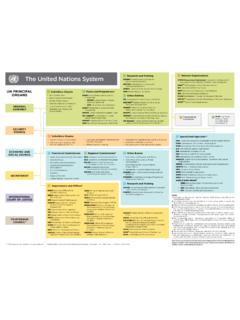Transcription of Sport-in-Development A Monitoring and …
1 Sport-in-Development A Monitoring and evaluation manual Professor Fred Coalter University of Stirling CONTENTS Page SECTION 1: INTRODUCTION 1 Sport in development 1 Sport plus and plus sport 1 The manual 2 SECTION 2: WHAT IS Monitoring AND evaluation ?
2 9 Introduction 9 More than accountability: formative M&E 9 Process-led and participatory evaluations 10 Why a process-led approach to M&E? 10 Logic models and managing for outcomes 12 SECTION 3: AIMS, OBJECTIVES AND INDICATORS 13 What are Aims and Objectives? 13 Involving others in the process 16 Indicators 16 Effectiveness 17 Economy and efficiency
3 18 SECTION 4: DEVELOPING A LOGIC MODEL 21 Thinking about sport and sufficient conditions 21 Theory and logic in the design of programmes 23 Some complicating issues 30 SECTION 5: COLLECTING INFORMATION 31 Introduction 31 Aims and objectives 33 Resources and inputs 33 Developing leaders and coaches
4 35 Programme: volume and process 37 Sporting inclusion 38 Sporting outcomes 39 Individual outcomes 1 and 2 40 SECTION
5 6: REPORTING INFORMATION 47 The need for reporting 47 Structure of the report 47 Proof-reading and editing 48
6 REFERENCES 49 APPENDIX A: Illustrative Questionnaire 51 FOREWORD At the World Sport s Forum in March 2000 Louise Fr chette, the UN Deputy Secretary General, stated that, The power of sports is far more than symbolic. You are engines of economic growth. You are a force for gender equality. You can bring youth and others in from the margins, strengthening the social fabric. You can promote communication and help heal the divisions between peoples, communities and entire nations.
7 You can set an example of fair play. In November 2003 The General Assembly of the United Nations adopted a resolution affirming its commitment to sport as a means to promote education, health, development and peace and to include sport and physical education as a tool to contribute towards achieving the internationally agreed development goals, including those contained in the United Nations Millennium Declaration. The United Nations declared 2005 to be the Year of Sport and Physical education, stating that the United Nations is turning to the world of sport for help in the work for peace and the effort to achieve the Millennium development Goals.
8 Such initiatives served to promote a range of sports based initiatives under the collective term of Sport-in-Development . Although many Sport-in-Development initiatives had existed prior to the UN interest, there has been a rapid growth in Sport-in-Development programmes as sport has responded to the HIV/AIDS pandemic. For example the Kicking AIDS Out! Network was established in 1999 and the first International Conference on Sport & development was held in Magglingen/Switzerland in 2003. This rapid growth has been accompanied by a desire to monitor and evaluate the effectiveness of such programmes.
9 Following a UNICEF seminar in New York in February 2005 to discuss such issues, UK Sport (in partnership with UNICEF and Magic Bus) commissioned Professor Fred Coalter (University of Stirling, Scotland) to produce a case study-based manual to assist in the Monitoring and evaluation of Sport-in-Development organisations. The selected case studies were: Magic Bus (Mumbai), Mathare Youth sport Association (Nairobi); Go Sisters (Lusaka) and Youth Education Through Sport (Harare). The initial intention was to produce a manual to enable such organisations to measure the impacts of their work (improved self-esteem; increased knowledge of HIV/AIDS; gender equity and empowerment and so on).
10 However, the experience of working with the case study organisations led to a revision of this approach, with much greater emphasis being placed on process Monitoring and evaluation . The basic premise of the manual is that a process-led approach will contribute to staff development and capacity building, greater organisational integration, and more coherently designed and consistently delivered programmes. This is not to imply that measuring outcomes is not important. Rather, the manual is based on the philosophy that a broader, more integrated, approach to Monitoring and evaluation in which both process and outcome approaches are viewed as necessary and inter-dependent.
